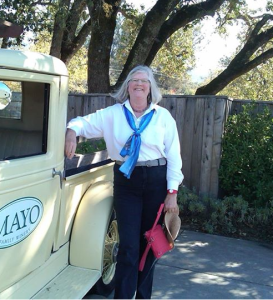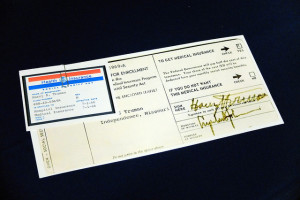Today SevenPonds spoke with Pat Macholl, a volunteer counselor with Legal Assistance for Seniors/Alameda HICAP. Her San Francisco-based office helps clients learn how to navigate their healthcare benefits through Medicare. Macholl teaches people about their benefits at the end of life, as well as preparations for retirement, across the county.
Marissa: Thanks for joining us, Pat. What made you get started in this career?
Pat: Well, I’m actually a volunteer. I went into retirement years ago, when I used to be a TV research director. I did not go gracefully into retirement (laughs). I’m not the type of person who can just sit around watching soap operas and eating candy. What got me started in this volunteer work was my friend. She mentioned that Medicare was looking for volunteers to help people navigate the complicated benefits system. I decided to try it, thinking it would be something to do to keep my mind sharp, you know, learning all of the training materials. What I soon realized is that Medicare is not that simple, it’s not that transparent for people who don’t know how to navigate the paperwork. People get their medical care from their insurance through their jobs, but when they approach that age for retirement, they don’t pay attention to what they need to do to keep their healthcare. It’s been an eye opening experience for me.
Marissa: In what way?
Pat: I saw people who had these good pensions, who always had medical coverage through their work, but who were shocked to discover the cost of medical care after they retired. Medical costs are a real shock. At least half of the people I see don’t make a tremendous amount of money in retirement, so it has an effect on them. I figured I’d just become an expert in the field, read through all of the manuals, but I was surprised to see just how many people I was helping. I have satisfaction in that.
Marissa: What do you do as a counselor?
Pat: We mainly do two things for people. First, I work on individual counseling sessions for people who are aging into Medicare, as they’re turning 65. A lot of them are still working, and want to know things like, “When I turn 65, do I have to sign up for Plan B?” “No, you don’t.” So I walk them through that process. We’re a nonprofit that operates on a county basis nationwide, so all of this is at absolutely no cost to the clients.
The second thing we do is help people who don’t have money to pay for prescriptions. I once had this soft-spoken, white-haired grandmother come into our office absolutely frantic. She owned the home she had lived in for years in San Francisco, but she was only living on $746 per month. She was also a breast cancer survivor with a lot of medical bills and doctor’s visits. She took public transportation to see us, and she sat in our lobby an hour before her appointment because she couldn’t drive herself there. What was amazing is that she thought she could handle paying for her medical expenses living on what little she had. In reality, she had no hope of paying for her bills. What she didn’t know is that she qualified for low-income benefits, and that she didn’t have to worry. We got everything handled for her. It was heartbreaking watching her try to live in this expensive city and pay her medical bills alone. She had no idea.
Marissa: Wow. And San Francisco has such a high cost of living! Do you find that a lot of people have trouble understanding the benefits they have?
Pat: Oh yes. The other part is that we get a full spectrum of intelligences that come through our doors. I have to be aware of all different communications styles when I work with people on understanding their eligibility. Are they fluent in English? You never really know until your client comes in, so that affects how well we communicate. Now, I’m 68, and I know that hearing impairment, sight impairment and cognitive abilities can change and affect your ability to cope with these sort of issues, especially as we get older. I had to learn how to communicate with non-verbal cues as well. The other part of it is, will there be a cultural difference? I’m an elderly, white, college-educated female, but I need to be prepared to understand where all of my clients are with their communication and background. Whether they’re from India, China, Thailand or what have you, I need to explain this complicated system, and sometimes that involves using a translator. That can get complicated, because I never know exactly how the translator is communicating what I’m saying.
Marissa: Why do you think Medicare is such a complicated system for the average person to navigate on their own?
Pat: First of all, as a country, we expect our employers’ group health plans to cover our needs. We don’t pay attention to our insurance because we never had to in the past, if we had good coverage through our work. The second part is that we have a multitude of choices that can become bewildering. I deal with this stuff every day, so it’s become rote to me. This is not within the normal scope for most people though. It gets frightening, especially when you’re dealing with paying these huge bills. They need somebody to sit there with them and explain things. The third reason is that most people have no clue how to read their explanation of benefits that comes in the mail.
That has nothing to do with intelligence, either. I knew a woman who had a Master’s degree who was absolutely brilliant. She once had an explanation of benefits mailed to her that was 45 pages long. Now, I can barely operate my smartphone. I always say, the phone might be smart, but it has a dumb owner (laughs). So here is this intelligent, educated woman who is panic-stricken because she can’t figure out this paperwork, and it took me 45 minutes to get through all of it, even with all of the specialized training I have. The main thing I want people to know is that they’re not idiots if they don’t know how to read this stuff. There is help. We have a cadre of people out there who have taken the time to learn this system, and our clients don’t have to walk alone.
Today, in the second part of a two-part interview, SevenPonds spoke with Pat Macholl, a volunteer counselor with Legal Assistance for Seniors/Alameda HICAP. Her San Francisco-based office helps clients learn how to navigate their healthcare benefits through Medicare. Macholl teaches people about their benefits at the end of life, as well as preparations for retirement, across the county.
Marissa: I asked you earlier about what made you join this organization, and you said you were surprised that your work helped people as much as it did. Can you tell me about a few of your most memorable moments?
Pat: Oh yes. Well, first of all, the level of assistance varies depending on who walks into my office each day. A lot of times, people will be so grateful to me, when I don’t feel as though I did much for them at all. The first memorable person was the woman I told you about earlier. I was struck by how horribly important it was to her to pay her bills on time. Even when she was struggling to survive, that was still important to her.
I see people with courage. One couple came in to my office with their two children. The child was challenged with a disability, and the parents were in their late 50s. I couldn’t help but think, “My god, look what’s going to happen to these children if they lose their parents. Who will take care of them?” I think about them a lot.
Another woman came in with her son, who was this beautiful young guy in his 20s. He had a traumatic brain injury, but he had very little medical coverage. I remember him well, because there was just nothing I could do for him. Now, typically you need at least 40 quarters of earning history with your employer to qualify for the type of benefits he needed to pay off his medical bills. He had been in a horrible accident, so he went from being a useful employee at his company to being completely incapacitated. His insurance premiums skyrocketed. It was heartbreaking for me to tell him that I couldn’t help. I had to force myself to move on from it, even though I was heartbroken.
Marissa: Wow. Do you find that most people who come to you for help are in situations like that?
Pat: Sometimes. Most of the time, we get a lot of people who have no idea that they even qualify for benefits. You know, it’s always funny to me to see what people’s idea of being broke looks like (laughs). Remember that woman who was trying to live on less than $1,000 per month in San Francisco, and thinking she was doing fine? I remember one day one of our volunteer coordinators came into my office just fuming. He had gotten off the phone with a woman who complained to him about how little money she had, and that she was completely broke. When he asked her how much she made to see if she qualified for benefits, he found out she makes more than he does! Your sympathy dries up at that point (laughs).
Marissa: I used to work in medical billing, so believe me, I know that feeling (laughs). When I was working, I also remember that a lot of people who came into my office had no idea what their insurance required. What tips can you give our readers about finding their own benefits?
Pat: See, I knew I liked you! (laughs) The number one tip I wish more people knew is that paperwork is a huge part of requesting medical benefits. If you come in to my office without all of the paperwork you need, then there’s not much I can do for you. I remember what it was like before I did this work. We tend not to pay attention to the paperwork because there’s usually so much of it. I tell people, “Bring everything, every single piece of paper you’ve received, even if you don’t think you’ll need it.” People don’t read that stuff. They can’t! Sometimes the print is so tiny, and the language is so confusing, that it really does take an expert to figure it out. I knew a woman who was a doctor of psychology; she was so intelligent, but she gets nothing out of her insurance paperwork when she reads it.
Marissa: How do you navigate your sessions with people?
Pat: I start with a few questions. First, what do you have going on right now that we need to handle? Then, what are you going to face in the future? What are you going to need? Sometimes, this takes multiple appointments because people never think ahead about what they might need 10 years from now.
Marissa: How does this connect to end-of-life care?
Pat: People with lives that revolve around medical appointments absolutely need this sort of guidance. There are too many choices, and that makes many of us freeze. I like the people I work with to think about their needs before I point them in the right direction. I walk them through each decision until they are comfortable making the choice for themselves. I see plenty of caretakers who are worried about coping with the loss of their loved ones, and that makes it tough to make these decisions. I go over what hospice care means, and whether they need this option based on their medical history. I point them to Medigap if they just have some ongoing medical needs. I walk them through Part D prescriptions, and how to get their insurance to cover their medications.
With regard to end-of-life specifically, I believe that everyone should have an advanced directive and power of attorney granted to someone they trust. In the event that something happens to them, it also helps me get them the coverage they need when they’re not able to get it for themselves. They have these wallet-sized cards these days that have all of your vital information on them: who your doctor is, what prescriptions you take, whether you want to be intubated. All of these benefits vary by state, so I recommend everyone looks up their own county to find these resources.
Marissa: Thanks so much, Pat, for speaking with us!
Pat: Thank you!
Pat Macholl’s Step-By-Step Guide for Checking County Benefits:
1. Visit medicare.gov and look at the menu at the top of the screen.
2. Click on the Forms, Help and Resources tab.
3. Select “get help paying costs.”
4. On the right, under the box labeled “find someone to talk to,” select your state.
5. Call the phone number listed under SHIP — State Health Insurance Assistance Program.

 How Do You Navigate Your Medical Benefits After Retirement? An Interview with Pat Macholl
How Do You Navigate Your Medical Benefits After Retirement? An Interview with Pat Macholl





 “Help Me, Helen”
“Help Me, Helen”
 Recovering Cremation Remains After the Los Angeles Fires
Recovering Cremation Remains After the Los Angeles Fires
 “As Tears Go By” by Marianne Faithfull
“As Tears Go By” by Marianne Faithfull














